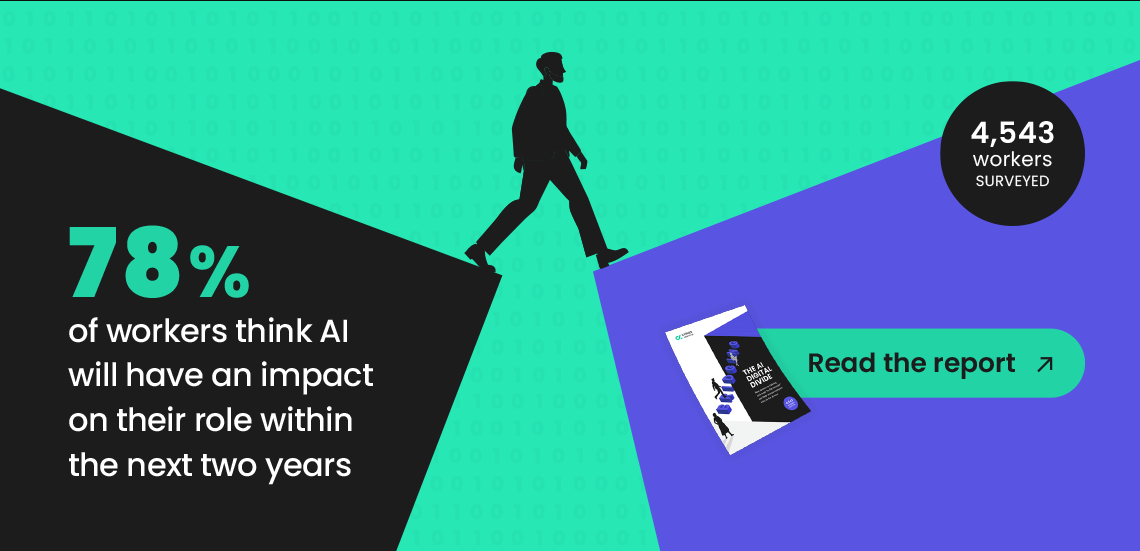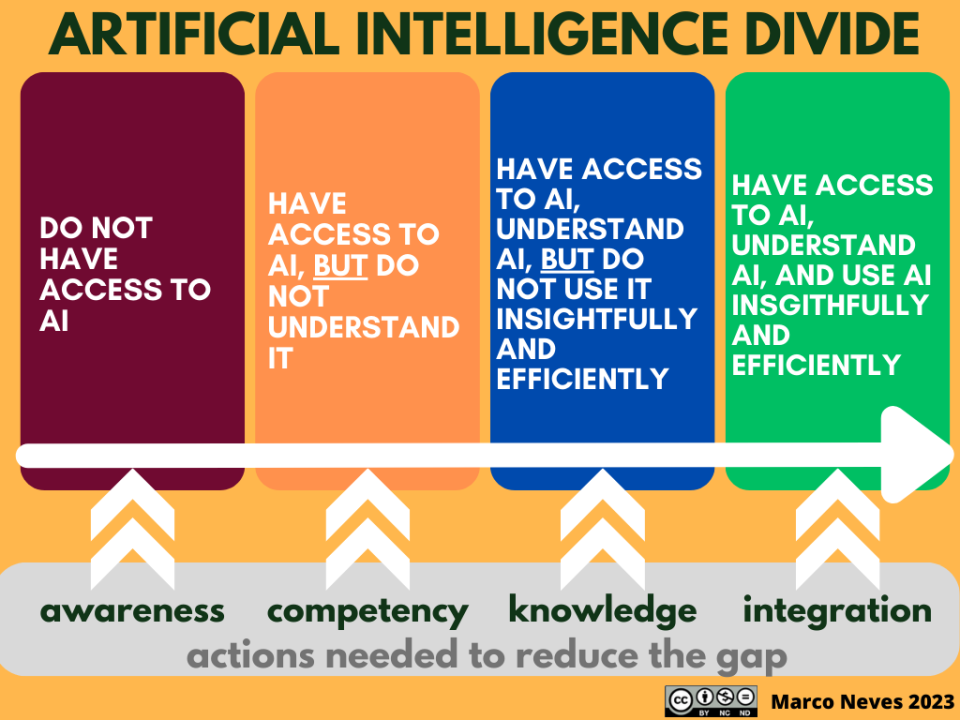
Artificial Intelligence (AI) is rapidly transforming industries, economies, and societies, promising innovations that could significantly improve our lives. From personalized learning experiences to healthcare diagnostics and environmental solutions, AI is proving to be a game-changer. However, as the adoption of AI technology grows, a pressing challenge has emerged: the AI digital divide. This divide refers not only to unequal access to AI tools and infrastructure but also to the disparity in education and training opportunities. Read on to learn more.
Understanding the AI Digital Divide in Education
The AI digital divide, in the context of education and training, is about the unequal opportunities for individuals and communities to acquire the skills and knowledge needed to work with and leverage AI technologies. While tech hubs in developed countries are brimming with resources and training programs for the AI workforce, many underserved communities, especially in rural areas or developing countries, lack the infrastructure, educational tools, and platforms to even begin learning about AI.

The gap is also evident in the type of AI education available. For some, exposure to AI concepts may be limited to theoretical knowledge, while others may have hands-on access to cutting-edge tools and platforms. As AI continues to permeate industries, those without adequate training or understanding may be left behind, unable to adapt to an increasingly automated and AI-powered world.
The Importance of Education in Bridging the AI Divide
Education plays a crucial role in bridging the AI divide. AI has the potential to level the playing field, offering solutions to global challenges such as inequality, climate change, and health disparities. But without proper access to education and training, individuals in disadvantaged communities may not be able to unlock these benefits. The implications of this lack of access are profound. Those who cannot engage with AI will miss out on opportunities to upskill and stay competitive in the workforce, especially as AI and automation continue to disrupt traditional job markets.
Moreover, a lack of diverse voices in the development of AI technologies could result in systems that are not inclusive or equitable. For AI to truly benefit all people, its development and deployment must reflect a broad range of perspectives. This requires that individuals from all backgrounds have access to the knowledge and skills to not only use AI but also shape it.
Expanding Access to AI Education
One of the first steps to closing the AI digital divide is increasing access to quality AI education, particularly in underrepresented areas. Governments, educational institutions, and private organizations must invest in providing affordable, accessible AI training programs. This can be achieved through a combination of traditional education and online platforms, which can reach a global audience.

Online learning platforms like Coursera, edX, and Udacity have made AI education more accessible by offering courses from top universities and institutions. These platforms often offer free or low-cost courses on topics ranging from machine learning and data science to AI ethics and policy. By expanding these offerings, especially in underserved regions, we can make AI education more equitable.
Governments and businesses can partner to create training initiatives that address local needs. For example, tech companies like Google, Microsoft, and IBM have already launched various initiatives to provide AI training to individuals in developing countries. Such partnerships can bring cutting-edge AI resources to communities that would otherwise lack access.
Introducing AI concepts into primary and secondary education is essential for building a foundation of knowledge early on. Schools should offer STEM (Science, Technology, Engineering, and Mathematics) programs that include AI, robotics, and data science. Teaching kids how to think computationally and engage with AI tools will better prepare them for the future workforce.
In addition to formal education, local communities can host workshops, boot camps, and mentorship programs designed to provide practical, hands-on training in AI. These programs can help individuals in marginalized communities build AI skills in a way that is both relevant to their daily lives and aligned with local economic opportunities.
Promoting Lifelong Learning and Reskilling
AI is evolving at an exponential rate, meaning that what we learn today may be outdated tomorrow. Therefore, education systems must embrace lifelong learning as a core principle. Workers who may have been displaced by automation should be provided with opportunities to reskill and learn new AI-related skills that are in demand. This is particularly important for adults in the workforce who may not have had the opportunity to study AI during their formal education years.
Governments and businesses must support reskilling programs that are accessible, flexible, and tailored to the needs of working adults. Online courses, micro-credentials, and certification programs are an excellent way to allow individuals to learn at their own pace while balancing work and family responsibilities. Moreover, initiatives like apprenticeships and AI boot camps can provide more immersive, hands-on learning experiences, helping individuals gain real-world skills.
Addressing the Gender and Diversity Gap in AI Education
Another critical aspect of bridging the AI divide is ensuring diversity in AI education and training. Women, people of color, and individuals from low-income backgrounds are disproportionately underrepresented in the tech and AI fields. This lack of representation leads to biases in AI systems and excludes many valuable perspectives from the development process.
To address this, efforts should be made to encourage and support underrepresented groups in pursuing AI education. Initiatives like scholarships, mentorship programs, and targeted outreach to diverse communities can help create a more inclusive AI workforce. For example, organizations like Women in AI and Black in AI provide networks and resources for people who face barriers to entering the field, helping them to access training and connect with mentors.
Bottom Line
Bridging the AI digital divide from an education and training perspective is crucial to ensuring that AI's transformative potential is accessible to everyone. In doing so, educators and instructors with a Diploma in Virtual Learning Design and Delivery not only address social and economic inequalities but also ensure that the future of AI is shaped by a diverse, inclusive, and responsible community of learners and innovators.
We believe education should be accessible for everyone. That’s why we don’t charge for our blogs. Find the right course that will help you in your career with us, contact us at +6621056101. You can mail us at act@asiancollegeofteachers.com
Written By : Victoria Lewis
Centre For Training & Professional Development (CTPD) - The Trading brand of TTA Training Private Limited, India is a ISO 9001:2015 Company




© 2021 - Centre For Training & Professional Development (CTPD). All Rights Reserved. Centre For Training & Professional Development (CTPD) trading brand of TTA Training Pvt. Ltd (India) - CIN U80902WB2016PTC215839, Asia Teachers Training Co., Ltd (Thailand) - Registration No. 0105558193360 & Asian College Of Teachers Ltd (UK) - Company Number 9939942 & Asian College Of Teachers LLC, (USA) - Federal Tax Identification Number 30-1261596
Designed by kreativewebtech